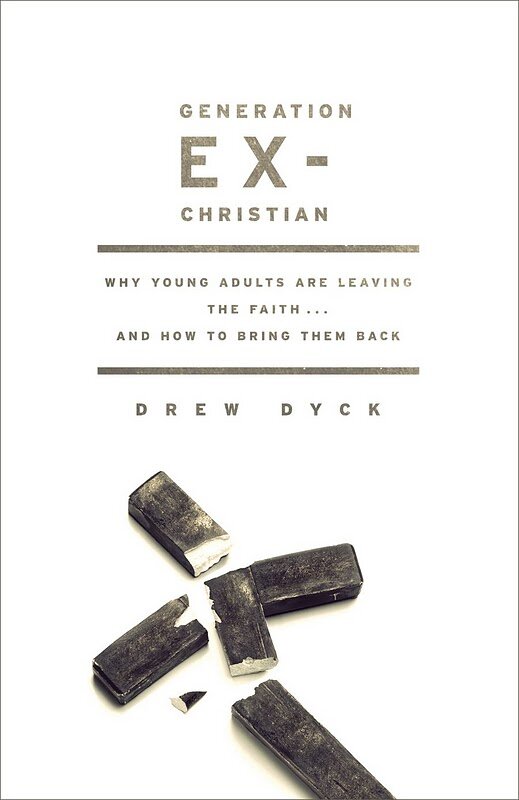Drew Dyck, Generation Ex-Christian: Why Young Adults are Leaving the Faith…And How to Bring Them Back. Moody Publishers, 2010.
Note: This listing is part of the site archive. While these materials may have some enduring value, it is strongly suggested that you use the reference link below for possible updates or click through to Amazon and allow their settings to suggest more current resources.
Referenced in: Generational Issues in Churches
LifeandLeadership.com Summary
Dyck draws on the research of others such as Thom Rainer, but adds to it his own interviews with more than 100 people. The special contribution is his helpful identification of six different types of the younger generation who leave the church, and what may be done to reach them. These are not scientifically precise categories, but represent the themes that emerged in his research.
Below is Dyck’s typology of postmodern leavers:
- Recoilers – This is the group who had painful experiences with the church while growing up. Thus, “God is guilty by association” with the perpetrators of the abuse. They may mask their emotional rejection by presenting intellectual doubt.
- Modern leavers – These are the Dawkins, God Delusion types who simply reject Christianity’s truth claims.
- Neo-pagans – Here Dyck talks about Wicca, one of the fastest growing religions in the United States. They are very emotionally opposed to Christianity, and if they do open up, it comes out as a “river of molten rage.” They are reached as people share their stories and demonstrate genuine concern for creation.
- Rebels – Dyck defines this as the hardest group to reach because they have no desire to submit themselves to God. They are not so much intellectually opposed to Christianity, but are more “moral atheists.” They are reached through prayer and relationships.
- Drifters – This group never had strong faith, and just drifted away almost unnoticeably. They are reached by helping them face the real challenges of discipleship, and introducing them to intergenerational relationships.
For each group, he describes what they think, why they left the church, and how to bring them back.
This is a very helpful text, provided one avoids labeling and “pigeon-holing,” and simply uses it to understand the varied forms of rejection by many leave the church today.
From the Publisher
Young people aren’t walking away from the church—they’re sprinting. According to a recent study by Ranier Research, 70 percent of youth leave church by the time they are 22 years old. Barna Group estimates that 80 percent of those reared in the church will be “disengaged” by the time they are 29 years old. Unlike earlier generations of church dropouts, these “leavers” are unlikely to seek out alternative forms of Christian community such as home churches and small groups. When they leave church, many leave the faith as well.
Drawing on recent research and in-depth interviews with young leavers, Generation Ex-Christian will shine a light on this crisis and propose effective responses that go beyond slick services or edgy outreach.
But it won’t be easy. Christianity is regarded with suspicion by the younger generation. Those who leave the faith are often downright cynical. To make matters worse, parents generally react poorly when their children go astray. Many sink into a defensive crouch or go on the attack, delivering homespun fire-and-brimstone sermons that further distance their grown children. Others give up completely or take up the spiritual-sounding “all we can do is pray” mantra without truly exploring creative ways to engage their children on matters of faith. Some turn to their churches for help, only to find that they frequently lack adequate resources to guide them.
This is where Generation Ex-Christian will lend a hand. It will equip and inspire parents, church leaders, and everyday Christians to reawaken the prodigal’s desire for God and set him or her back on the road to a dynamic faith. The heart of the book will be the raw profiles of real-world, young ex-Christians. No two leavers are identical, but upon close observation some categories emerge. The book will identify seven different kinds of leavers (the postmodern skeptic, the drifter, the neopagan, etc.) and offer practical advice for how to connect with each type. Shrewd tips will also intersperse the chapters alerting readers to opportunities for engagement, and to hidden landmines they must sidestep to effectively reach leavers.
About the Author
DREW DYCK is the editorial manager of the ministry team at Christianity Today International. His responsibilities include editing four online publications, including BuildingChurchLeaders.com, a ministry site that attracts 100,000 monthly visitors. Drew holds an M.A. in Theology from Fuller Theological Seminary. Before coming to Christianity Today he was the editor of New Man magazine. He and his wife, Grace, live in Carol Stream, Illinois and attend Jericho Road Church.
***For additional information on this resource, including reviews, click the bookstore links. Check the reference at page top or the links below for resource guides on related topics.***
Related Areas
See Other Resources on Generational Issues:
See Resource Guides on Over 100 Areas of Ministry Leadership:


